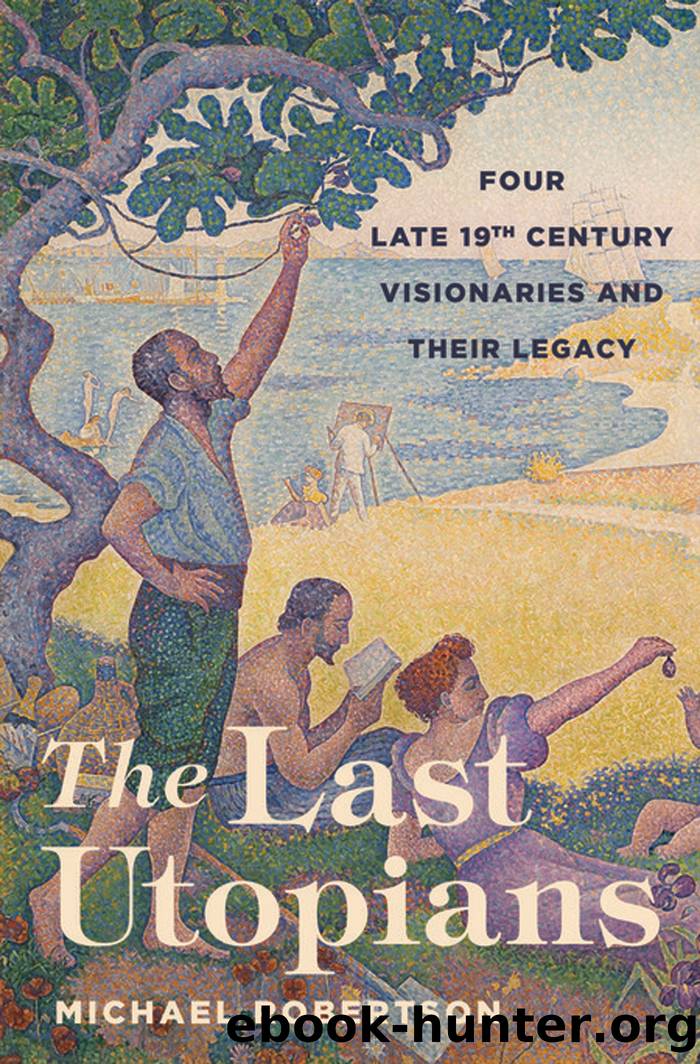The Last Utopians by Robertson Michael;

Author:Robertson, Michael;
Language: eng
Format: epub
Publisher: Princeton University Press
Published: 2018-07-14T16:00:00+00:00
Carpenter’s vision of Urnings as utopian trailblazers was bound up in his evolutionary view of human history. After the turn into the twentieth century, at the same time as he elaborated his ideas about Uranians’ utopian potential, he became absorbed in anthropological speculation about homosexuals’ role in the origins of human civilization. He published an article on the topic in 1911 in the American Journal of Religious Psychology, which became part of his book Intermediate Types among Primitive Folk (1914). Carpenter wrote in the waning moment of the gentleman amateur, before the discipline of anthropology had become fully professionalized. Intermediate Types among Primitive Folk has been called “a gay Golden Bough”—a synthesis of carefully footnoted ethnographic material and unbridled speculation.70
The book’s central thesis is that Urnings were responsible for the rise of civilization in prehistoric times. In the earliest human societies, most men were warriors and hunters, while women engaged in agriculture and domestic work. Absent some motive force, human society might have remained indefinitely in this primitive phase. It was the Urnings, or “intermediate types,” who made human progress possible. Uranian men, less interested in hunting and warfare, and Uranian women, not content to remain in the home, turned to other activities: they composed songs, studied nature, or speculated about the supernatural. “They became students of life and nature,” Carpenter theorized, “inventors and teachers of arts and crafts, or wizards … and sorcerers; they became diviners and seers, or revealers of the gods and religion; they became medicine-men and healers, prophets and prophetesses.”71 Intermediate types, he concluded, laid the foundation of art, science, literature, and religion. Far from being the social outsiders that most Britons regarded them as, homosexuals were responsible for the rise of civilization.
Carpenter’s anthropological theories were bound up with his religious ideas. His studies with the Hindu sage Ramaswamy had led him to the concept of “cosmic consciousness,” a mystical apprehension of universal unity. During the early twentieth century, as he developed his sweeping views of human history, he theorized that cosmic consciousness was not simply a transitory state accessible to a few spiritual adepts but rather the end-stage of an evolutionary process. The earliest humans had possessed “simple consciousness,” the unmediated awareness of the world seen in animals and young children. Next came civilization and “self consciousness,” which Carpenter regarded as a “fatal split” between self and world. Self consciousness led to individualism, which over the centuries had resulted in the economic exploitation and environmental devastation of present times. However, he believed that the West was poised at a moment of transition. “Finally,” he wrote, “with the complete antagonism of subject and object, of ‘self’ and ‘matter,’ … and the terrible disruptions of life and society which ensue—comes the third stage.” Cosmic consciousness arrives, “the long process of differentiation comes to an end, and reintegration takes its place.”72 This third stage of consciousness, in which differences between women and men, lower and upper classes, and humanity and the natural world are reconciled, was not yet widely dispersed.
Download
This site does not store any files on its server. We only index and link to content provided by other sites. Please contact the content providers to delete copyright contents if any and email us, we'll remove relevant links or contents immediately.
| Ancient & Classical | Arthurian Romance |
| Beat Generation | Feminist |
| Gothic & Romantic | LGBT |
| Medieval | Modern |
| Modernism | Postmodernism |
| Renaissance | Shakespeare |
| Surrealism | Victorian |
4 3 2 1: A Novel by Paul Auster(11035)
The handmaid's tale by Margaret Atwood(6839)
Giovanni's Room by James Baldwin(5873)
Big Magic: Creative Living Beyond Fear by Elizabeth Gilbert(4719)
Asking the Right Questions: A Guide to Critical Thinking by M. Neil Browne & Stuart M. Keeley(4567)
On Writing A Memoir of the Craft by Stephen King(4206)
Ego Is the Enemy by Ryan Holiday(3983)
Ken Follett - World without end by Ken Follett(3968)
The Body: A Guide for Occupants by Bill Bryson(3791)
Bluets by Maggie Nelson(3705)
Adulting by Kelly Williams Brown(3663)
Guilty Pleasures by Laurell K Hamilton(3578)
Eat That Frog! by Brian Tracy(3509)
White Noise - A Novel by Don DeLillo(3430)
The Poetry of Pablo Neruda by Pablo Neruda(3358)
Alive: The Story of the Andes Survivors by Piers Paul Read(3304)
The Bookshop by Penelope Fitzgerald(3222)
The Book of Joy by Dalai Lama(3212)
Fingerprints of the Gods by Graham Hancock(3207)
